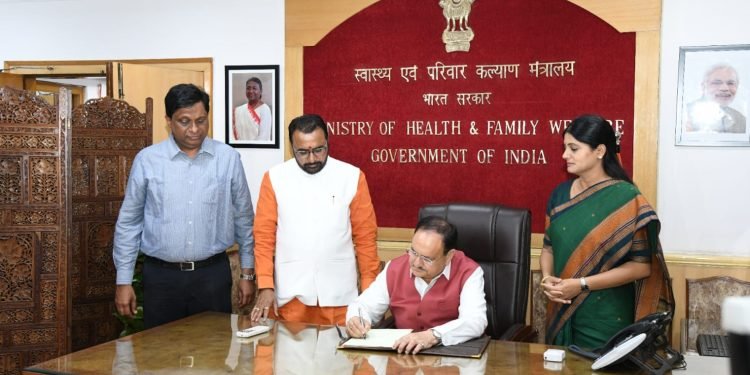Delhi -The Indian Council of Medical Research (ICMR) has recognized neonatal mortality as a critical national health research priority and is undertaking various initiatives to improve the health of newborns and children. One of the major efforts by ICMR is the “Sankalp” Program, aimed at achieving single-digit neonatal mortality rates. ICMR is also working on developing comprehensive intervention models to reduce stillbirths, focusing on evidence-based solutions to prevent stillbirths in India through collaborative analysis of pregnancy cohorts.
Additionally, ICMR’s Centres for Advanced Research have conducted studies revealing that the mutation profiles of childhood respiratory diseases in India differ from Western data. Other notable research includes studies on pediatric kidney diseases and the use of intravenous antibiotics to treat uncomplicated neonatal bacterial sepsis. ICMR has also launched the First Thousand Days of Life project, aiming to optimize comprehensive care during the critical early years.
The National Institute for Research in Reproductive and Child Health (NIRRCH), under ICMR, is conducting a multicentric study on newborn sickle cell screening across several states, as well as a population-based study on birth defects linked to the Rashtriya Bal Swasthya Karyakram (RBSK) program in rural Maharashtra.
In addition to these large-scale initiatives, ICMR has funded numerous projects across the country aimed at improving the health of newborns and children through its various research grants.
The Ministry of Health and Family Welfare supports a range of strategies under the National Health Mission (NHM), focusing on reproductive, maternal, newborn, child, adolescent health, and nutrition. These interventions aim to improve newborn and child health outcomes, with a special emphasis on marginalized and tribal populations, ensuring no discrimination based on gender, caste, or religion.
Key interventions implemented nationwide include the establishment of Special Newborn Care Units (SNCUs) and Newborn Stabilization Units (NBSUs) in medical facilities for the care of sick and small babies. Mother-Newborn Care Units (MNCUs) are designed to ensure mother and baby stay together, even for sick or low-birth-weight infants. Programs like Kangaroo Mother Care (KMC) and Home-Based Newborn Care (HBNC) focus on early skin-to-skin contact and improving care practices in communities.
Other important initiatives include the Janani Shishu Suraksha Karyakram (JSSK), which ensures free treatment for sick infants up to one year, and the Universal Immunization Programme (UIP), which provides essential vaccinations. The Mothers’ Absolute Affection (MAA) program promotes exclusive breastfeeding for the first six months of life, while the SAANS initiative works to reduce childhood pneumonia morbidity and mortality. The STOP Diarrhoea initiative focuses on the use of oral rehydration salts (ORS) and zinc to combat diarrheal diseases, and the Rashtriya Bal Swasthya Karyakram (RBSK) screens children for a range of health conditions to improve overall child survival.
Nutrition Rehabilitation Centres (NRCs) are set up to treat children with severe malnutrition, while the Anaemia Mukt Bharat (AMB) strategy tackles anaemia among pregnant women and schoolchildren. Additionally, capacity-building programs for healthcare providers are designed to enhance child health outcomes, including updated training packages for neonatal and childhood illness management.
ICMR continues to collaborate with various national and international stakeholders, including pediatric associations, non-profits, and research collaborators, to advance research on newborn and child health. This concerted effort demonstrates the government’s commitment to improving child health and reducing mortality across India.
The Union Minister of State for Health and Family Welfare, Shri Prataprao Jadhav stated this in a written reply in the Rajya Sabha today



